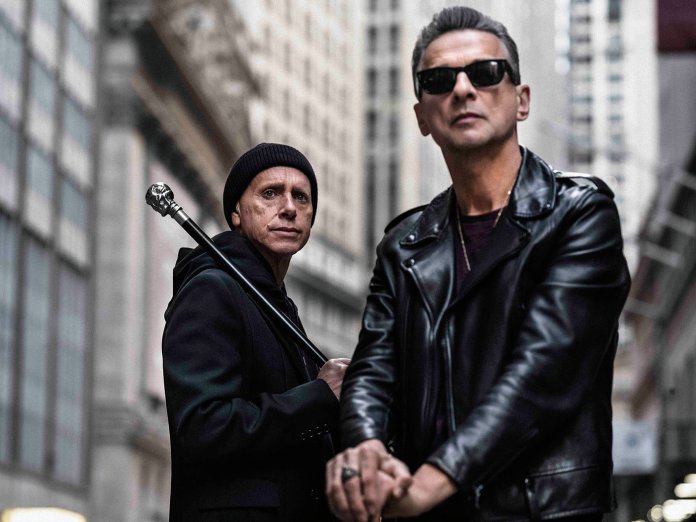Maybe Depeche Mode were always destined to assume their final form as a synth duo. Way back in their early days, after they formed at a Basildon school concert in June 1980, they felt a little like a rock band who hadn’t quite completed their electronic evolution, and had been left with vestigial members, guys who might have once been bass players or drummers, and now were simply required to prod monosynths while looking moody on Top Of The Pops. Vince Clarke certainly seemed to think so, jumping ship as soon as possible to form Yazoo and Erasure.
But maybe the other guys – Alan Wilder, recruited as a kind of in-house musical director after Clarke’s departure, and Andy Fletcher, the dependable Basildon soul of the band – were always needed as a kind of interpersonal buffer, precisely because, once things got cooking, the core of the band was too volatile to be sustainable. Flood identified Dave Gahan and Martin Gore early on as respectively the attitude and the ideas that fuelled Depeche Mode. But for all the band’s astonishing success, it never felt like a creative marriage of minds or even a wary co-dependency, but more like some highly unstable, fissile chemical reaction: the Essex wideboy turned LA rock casualty and the ruined choirboy turned Berlin sex dungeoneer. For much of the band’s imperial phase they couldn’t live on the same continent, let alone share a tour bus.
But now, following Fletch’s untimely death last year, they are two. And though as men in their sixties, post detox, rehab and therapy, you don’t expect spectacular, ruinous conflagrations, what’s remarkable is that Memento Mori, their 15th album, is their most powerful work this century. It’s the sound of a band entering a final act with a renewed sense of purpose, and sharp, sober new focus.
“Ghosts Again”, the lead single, emerged with February’s snowdrops and had a startling freshness, recalling Bowie’s “Where Are We Now?” in its bittersweet reckoning with lost time. The shade of Bowie was compounded by Anton Corbijn’s beautifully stark, Bergman-esque video, and the revelation that the song was one of a handful of new collaborations between Martin Gore and The Psychedelic Furs’ Richard Butler. The echo of Bowie, passed down through Butler’s phrases (“you drive like a demon”, from “Caroline’s Monkey”) and phrasing, into Gahan’s bereft croon (remember that he first got the DM gig after the fledging band saw him singing “Heroes” in an Essex scout hut) sets the tone for Memento Mori as a great, unexpected late career regeneration.
Though the songs and the direction of the album were conceived during lockdown before Fletch’s passing, from its stoic title on, the album is inevitably coloured by his loss. On “Wagging Tongue”, the sole Gahan-Gore co-write, Dave sings of how “everything feels hollow/When you watch another angel die”, while the twisting, Leonard Cohen-style couplets of “Don’t Say You Love Me” revolve around images of corpses, flowers and goodbye notes.
But while Bowie set sail for the beyond with a late turn into avant-jazz, Gore, with assistance from producer James Ford and engineer/tape looper Marta Salogni, has distilled the band’s sound down to some diamond-hard essence of Depeche Mode, all twinkling Kraftwerk kometenmelodie (“People Are Good” liberally quotes from “We Are The Robots”), flanged gothic bass (particularly on the epic closing “Speak To Me”) and darkly distorted guitar (on “Never Let Me Go”). After the laboriously strenuous post-rehab albums it all feels remarkably fresh, a return to the simplicity of their very first recordings.
But it’s a couple of outliers that feel like the heart of the record. “Soul With Me”, one of five Martin Gore solo compositions, is a sensational cosmic showtune, like Bowie crash landing onto the stage of Sally Bowles’ Cabaret, with Martin singing his heart out as he heads out into the afterlife: “I’m ready for the final stages/Kiss goodbye to earthly cages”.
“Caroline’s Monkey”, meanwhile, bears the strongest imprint of Richard Butler’s involvement. A synth-pop tune that might have fallen off Scary Monsters…, it boasts a sarcastic self-help litany of a chorus – “Fading’s better than failing/Falling’s better than feeling/Folding’s better than losing/Fixing’s better than healing” – before concluding with a heavily sardonic “Sometimes…”
The first is the closest Depeche Mode will ever get to performing “My Way”; the second, a kind of absurdist “the show must go on” declaration via Samuel Beckett. As they set out on what can’t help but look like a valedictory tour to face their final curtain, they couldn’t hope for a finer pair of anthems, or a more assured album, with which to venture into that vast good night.



